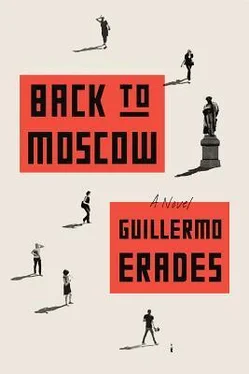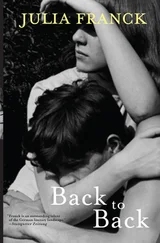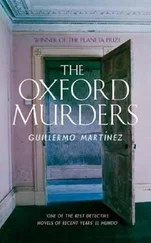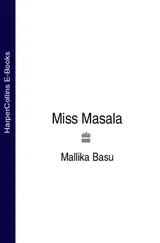After visiting two more churches, we were out in the air again and walking among rows of small wooden houses, which were like the dachas I’d seen outside Moscow, but better kept. The windows had ornate wooden frames. Now I thought about what would it be like to live in these places, comparing the two experiences, living as a monk or living as a Russian peasant, and I couldn’t decide which of the two was more idyllic. In a dacha I could live with Lena, who would cook while I repaired the roof and cut wood for winter, and, walking along the unpaved streets of outer Suzdal, I fully appreciated the beauty of that simple existence, even though I’d never cut wood or fixed a roof in my life. Yet in a monastery, I thought, I could receive spiritual stimulation, and I imagined having someone like Zosima, an elder, a saint, a spiritual leader and mentor to guide me through life, and then I realised I was too drunk to make any sense of my thoughts.
We passed the last row of dachas and then we were in a small park that ended in a forest. Among the trees, I took a few pictures of Lena, who was looking gorgeous, and I asked her to take her shirt off, then her bra. She glanced around to check, then did as I’d asked. She posed for me, topless, her jeans on, her arms extended above her head, pulling her breasts upwards, and I’ll always remember Lena like this — leaning on a tree, her breasts like perfect forest fruits — because, so many years after that day in Suzdal, I still keep those photos, and I look at them often, and Lena looks younger than I felt she was when the pictures were taken.
In the late afternoon, as the effects of the vodka dissipated, I was hit by a wave of exhaustion. I suggested we go back to our monastery and have an early night.
Back in the izba I kissed Lena. We lay on the bed but, when I was about to unzip her jeans, she said, ‘Sorry, not today.’ I was disappointed because it was our weekend away and I was having such a great time — I was feeling spiritual, high, and I thought it could be a special occasion. Now I knew the weekend would not be perfect. Then Lena said, don’t worry, I’ll do my best, and she — who had spent the entire afternoon praying, lighting candles and kissing icons — crawled down the bed, dragging the golden cross of her necklace over my shirtless body, pulling my jeans off, together with my underwear.
AT THE END OF summer the days remained mostly sunny but you could feel a chill in the air, especially late in the afternoon, and you knew that winter was forming somewhere deep in Siberia, gathering strength, preparing to descend on Moscow. Local girls, though, defied the change of seasons and continued to wear miniskirts as they paraded up and down Tverskaya.
I’d been living in Pushkinskaya for a couple of months now, closely observing life in the square, which I saw as a window onto the entire country.
Sometimes there were demonstrations, with a dozen, twenty protesters at most, who stood stoically across from McDonald’s, next to the Kroshka Kartoshka kiosk, unperturbed by the smell of baked potatoes, holding banners against the war in Chechnya and exhibiting black and white photographs of what I assumed were victims of the conflict. Often, though, the protesters were older and held pictures of Lenin and Stalin and red Communist banners or, occasionally, Orthodox crosses and religious icons with what looked like biblical quotes painted on them.
Sometimes I would see a bunch of demonstrators and, despite my best efforts to understand their cause, I could not figure out what they were protesting against, and nobody stopped to talk to them anyway, at least not the normal people, who just walked by and looked at them as if they were mental patients who had escaped from a madhouse.
I started to go for long morning walks. I tried new routes every day, venturing further away from the centre, discovering parts of the city previously unknown to me. Sometimes I would find myself walking in some remote neighbourhood, along wide avenues, past endless rows of concrete buildings, lost in a soviet landscape that was both shabby and monumental. When I lost my bearings, I would have to ask for directions to the nearest metro station to return to the centre.
Later, overwhelmed by the dimensions of the city, I began to take my walks closer to home, reducing my Moscow to manageable proportions — Pushkinskaya becoming the centre of an imaginary circle whose limits I no longer crossed. Mayakovskaya in the north, Tretyakovskaya in the south, Smolenskaya in the west, Chistye Prudy in the east. I would only venture out of these invisible urban borders, by taxi or metro, to attend university or to find new clubs with the brothers.
At some point I noticed that I’d settled into a fixed routine, turning always at the same corners, down the same alleyways, somehow finding comfort in the familiar details I encountered every day as I moved through the heart of the city.
After breakfast each morning, I would typically walk along the Boulevard, under the trees, then turn left at Bolshaya Nikitskaya, keeping to the left pavement, passing the old houses and the small church on the corner, until I reached the Tchaikovsky conservatory. At this point, I would often cross the street and sit on the terrace of Coffee Mania, where I would spend one or two hours drinking coffee and reading books in Russian with the help of a dictionary, writing down words and thoughts in my red notebooks.
I was now reading Chekhov in Russian. I had bought the collected works of Anton Pavlovich, a soviet edition from 1970, eight volumes in blue hardcover. The books, which I had acquired for a decent price in the basement section of the Moskva Bookshop, were lovely and smelled of ancient paper. A colour picture of a pensive Anton Pavlovich adorned the first page. I always carried one of the volumes in my backpack, usually the one with the dramaticheskie proizvedenya, all the plays, or the one entitled Rasskazy i Povesti 1895–1903 , which included Chekhov’s best-known stories. I liked reading the plays because they were subtle, understated, particularly the big four, and I admired the way Anton Pavlovich didn’t seem so much interested in telling a story as in conveying a nastroeniye — a mood or atmosphere.
Anton Pavlovich is the master of nastroeniye, Lyudmila Aleksandrovna had told me, and he certainly was, capturing in his writing the essence of late nineteenth-century Russia.
Sitting on the terrace of Coffee Mania, scribbling random thoughts in my notebook, I often found myself wondering what Chekhov would write, how would he manage to capture the nastroeniye, if he were to write scenes not about nineteenth-century provincial life but about the life of expats and dyevs in today’s Moscow.
‘IT’S BEEN RAINING FOR two weeks,’ I say, looking through the window. It’s dark and the rain is falling with violence. ‘Every thing is so dirty out there, I can’t wait for winter to arrive.’
Stepanov stands by the turntable, flipping through his records. He’s been playing Russian bands all night. ‘Winter should come soon,’ he says. ‘Last year by this time we had plenty of snow.’
I return to the sofa, slump down next to Colin. ‘How young do you think is too young?’ I ask.
Colin holds his empty glass up to the light, peers through it from different angles, as if judging the quality of its craftsmanship. ‘What do you mean?’
‘For a dyev.’ I notice comrade Brezhnev staring at me from across the room. Serious eyes. Bushy eyebrows.
Colin places the glass on the table and leans forward, half smiling. ‘To fuck her?’
‘No,’ I say. ‘To be with her. When do you think a dyev is too young for that?’
Diego is sitting on a chair, wearing his furry shapka, his large paw-like hands typing on his mobile phone. Black shirt unbuttoned, you can see his chest and facial hair meeting at an arbitrarily shaved line halfway up his neck. ‘How old is she?’ he asks.
Читать дальше












